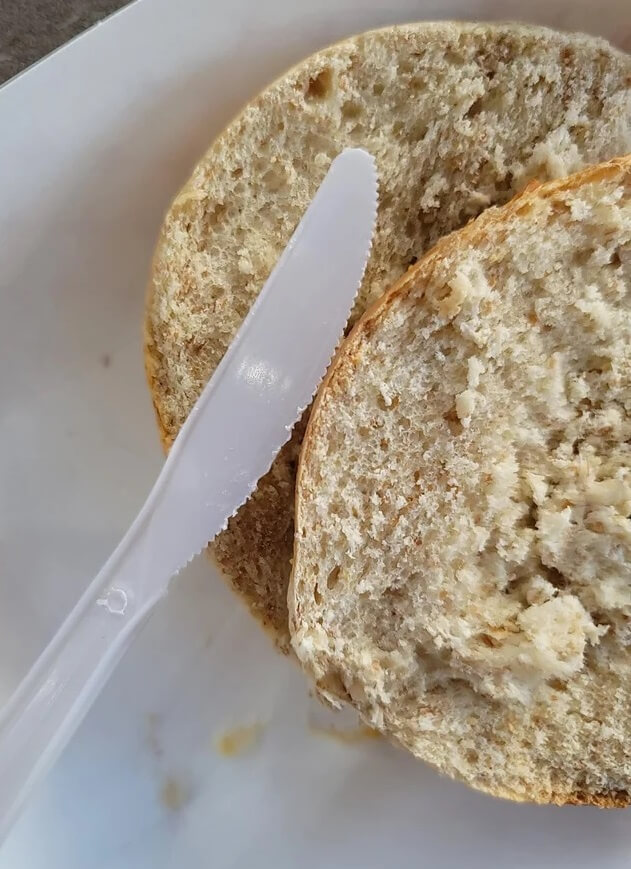A major problem with plastic products is that they produce microplastics, tiny plastic fragments that can collect in the human body and are tied to health problems.
The microplastics in water are most frequently talked about, but there are other sources too. One student was frustrated to realize that their school's flimsy plastic cutlery wasn't just inconvenient — it had possible health implications for them and their classmates.
🗣️ How much effort are you willing to make to reduce the amount of plastic and toxins in your home?
🔘 I'll do whatever it takes 👍
🔘 Only if it's an easy swap 😅
🔘 Only if it's cheaper 💰
🔘 Not interested 🚫
🗳️ Click your choice to see results and speak your mind
What happened?
The student posted about their experience on r/mildlyinfuriating, a complaint subreddit. "These knives can't cut through anything," they said.

In the photo they included, there was a small bread roll that had been cut in half. On top of it was a plastic knife. The plastic was extremely thin, and the edge was visibly damaged from cutting the bread, with many of the teeth bent or broken off.
"Brought it up with my school, but we are still eating plastic right now," the student said. In a comment, they added, "This has been an ongoing problem and I don't think they believe me."
Why does plastic cutlery matter?
Single-use plastic is already bad enough for people and the planet. Reusable alternatives are frequently higher quality and less expensive in the long run, so buying disposable items just wastes money and creates a worse experience. Plus, that's a lot of extra trash to deal with, especially at an institution as large as a school.
Meanwhile, since plastic is made from oil, it creates pollution when it's manufactured as well as breaks into microplastics when it's discarded.
But this example took it a step further. By buying such thin cutlery, the school virtually guaranteed that students would swallow some plastic, which could have implications for their health. Plastic contains many harmful chemicals, and the more students consume, the more they're at risk.
Why would the school choose plastic?
Traditional metal utensils can be problematic for schools. Many employ extremely strict policies that class butter knives as "weapons," as one commenter pointed out.
"One time I brought a butter knife to school to make a sandwich and the second I pulled it out a bunch of girls gasped and said 'Oh my god, he has a knife!'" the user said. "Teacher comes over, tells me to give her the knife. I do. No problem. They take me out of the lunchroom, don't even get to finish lunch, and I got in-school suspension."
Also, schools may have limited facilities and personnel to wash reusable dishes and cutlery.
However, that doesn't rule out more eco-friendly disposable options such as bamboo — which would also be stronger and less likely to cause health problems down the road.
What can I do about single-use plastics?
Besides turning to reusable products whenever possible, you can push for schools, companies, and other organizations to switch out plastic for healthier options. For example, two doctors recently conducted a plastic audit at their hospital to find areas where they could cut back.
Join our free newsletter for easy tips to save more, waste less, and help yourself while helping the planet.









